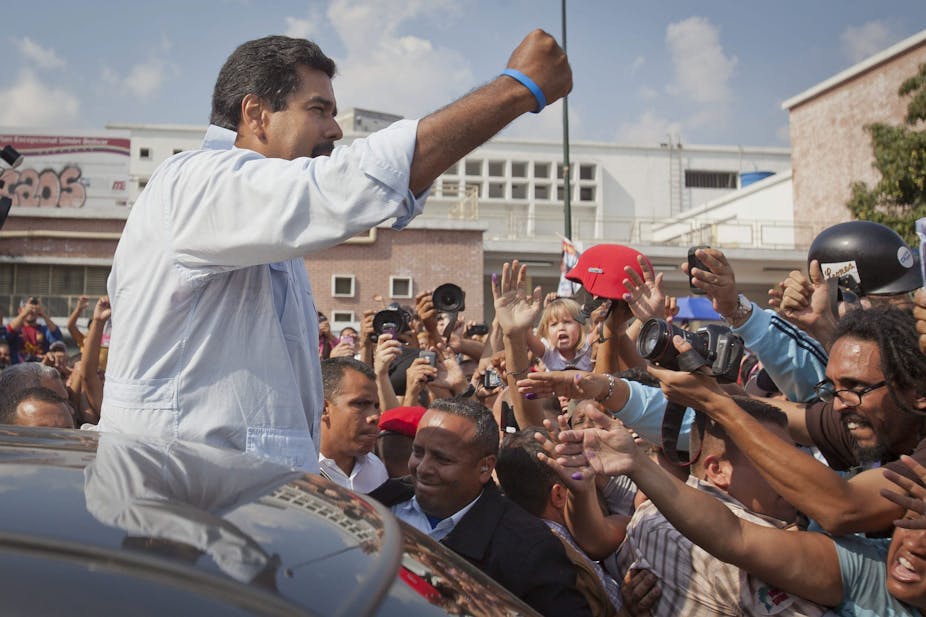The results of the Venezuelan presidential election to replace the late Hugo Chávez are in and were much closer than previously expected. Socialist party leader and Chávez’s anointed heir, Nicolas Maduro, has been called the winner but only by a margin of 1.6% or around 230,000 votes. Opposition candidate Henrique Caprilas Rodonski has refused to accept the result at the time of writing and will not do so “until every vote is counted”.
Maduro was earlier predicted to have won comfortably (by around 10-15 points) in early polling over his opponent. The subdued faces and applause at the victory celebration therefore said a lot.
It has been a little over a month since previous president Hugo Chávez succumbed to cancer, and 11 years to the day since he ended the failed coup against his reign. The campaign was the shortest in Venezuelan history, and like I have previously mentioned, Chávez’s ghost was a strong shadow over these elections as if he had never left.
The closeness of the margin suggests the chance for increased instability in the nation, and the process of Maduro’s transition to be difficult and lacking in legitimacy with unprecedented tension in the country.
But the electoral success of the ruling Partido Socialista Unido de Venezuela continues with the election of Maduro, a 50 year old former bus driver and the late president’s anointed successor. He was the former foreign minister, has close ties with Cuba, and is a dedicated man of the political left.
He has gone to great lengths to emphasise that he is the rightful successor to Chávez and pledged to continue his policies of the so-called Bolivarian Revolution, describing himself as a “son” of Chávez. And it is worth noting that within the ruling coalition of parties (known as the PSUV), there are plenty of dubious characters, but Maduro does not appear to be one of them, being seen as almost too dependable in his continuation of the Chávez legacy.
At an event in downtown Caracas before the election, Maduro declared:
I hope to live up to the responsibility he (Chavez) gave me, I aspire to live up to these people. They may know the poor of our country that will have me as his protector, his father, President…the Christ of the poor in Latin America.
The Venezuelan opposition have lost yet another election and have suffered from internal contradictions, loss of support, high profile defections, and had even considered once again abstaining. But at the same time, this is the closest election in their history, and the small margin will give them great hope especially considering the advantage of incumbency.
But what now is up in the air is whether the gains under a continuation of Chávez’s economic policies can be sustained. The possible bellwether will be Maduro’s decision to keep or remove the current minister of the economy, Pedro Morejón.
At the same time, Venezuela still struggles with a critical housing shortage and an exceptionally high crime rate. In polling last year, citizens said that crime was far and away the most important issue facing the country.
It is absolutely necessary for the country, and for his political success, that Maduro addresses the escalating and debilitating crime rate.
Regionally, Venezuela will keep its strong ties to Cuba. This will disappoint the United States, which has spent much of its time trying to prevent nations from developing diplomatic relations with the Caribbean nation.
Also, Maduro will continue to provide cheap oil to some of the poorer nations, including Nigaragua, Jamaica and Haiti, while attempting to build a strong Latin American bloc with the aid of neighbouring powers Brazil and Argentina, which was arguably the most important legacy of Chávez.

What was also at stake in this election is how the US and South America relate to each other. With the victory of Maduro, it continues to give some example and hope to progressive movements throughout the region and the world. As Maduro has stated himself:
Venezuela will continue supporting this regional transformation and building a new form of socialism for our times. With the support of progressive people from every continent, we’re confident Venezuela can give a new impetus to the struggle for a more equitable, just and peaceful world.
But this also means that the sophisticated democracy and increased participation that was built by Chávez will have supporters of Maduro expecting him to have the poor always at the forefront of thinking, as well testing the level of institutionalisation of the Chávez programs.
Maduro will need to develop his legitimacy as the new leader, which is made all the harder as he has spent much of his political career out of the public eye. He also needs to appeal to the voters that are not necessarily attracted to the socialism, but are swayed by the nationalistic appeals.
While daily problems such as crime and power cuts appeared not to hurt Chávez’s popularity - due to his near-religious status among supporters - Maduro may not be so immune as has been indicated by the closeness of the vote.
Further, he doesn’t have the charismatic power of Chávez, and there is some doubt that he will be able to hold the strong control over the party and the broader movement of “Chavismo”. This ideology contains not only military officers, oil executives and community organisers, but the powerful grassroots support network that Chavez has built up over the past 14 years, and which as Venezuelan expert George Ciccireiello Maher argues is the ground on which Chavismo stands on.
Yet at the same time, this could be an opportunity for the movement to get away from the centralisation of the revolution in the body of one leader and democratise the broad movement known as Chavismo.
What we can now look to is the wish that Venezuela can continue to create its own path, in a peaceful and hopeful manner in Maduro’s continuation of the Bolivarian revolution.

